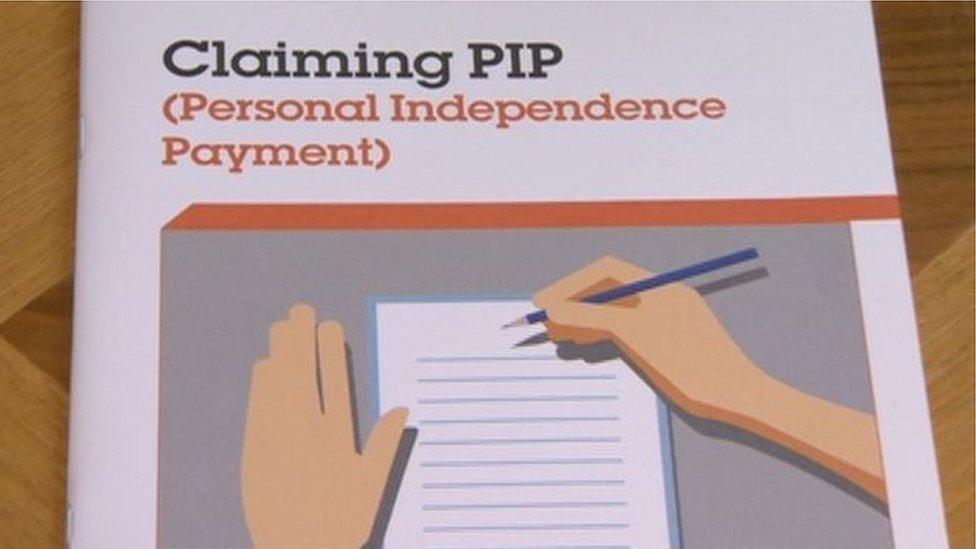PIP assessment: Capita apologises to council for errors
- Published

Councillors highlighted problems some vulnerable people in the north west faced when trying to access Personal Independence Payments (PIP) at the meeting
The company that assesses benefit claimants in NI, Capita, has apologised to Derry and Strabane councillors for any errors made by them in the past.
Capita and Department for Communities (DfC) officials were speaking at a special council meeting on Wednesday.
Councillors highlighted the problems some people faced when trying to access Personal Independence Payments (PIP).
Brendan Flynn of Capita said: "There's always a risk that we won't get things 100% right all of the time."
He told the meeting: "On the occasions where things do go wrong - we apologise - and we will continue to apologise and seek to put things right as soon as we become aware of any issue where we might have failed.
"We look to put in place safeguards, checks and balances and the continuous improvement processes to ensure those errors don't happen again."
Capita was hired in 2016 to carry out PIP assessments for the Department for Communities.

A small protest was staged outside the Guildhall on Thursday before the council meeting took place

Public Services Ombudsman report
In June, a report from the Public Services Ombudsman Margaret Kelly found that too many people in Northern Ireland had claims for Personal Independence payment "unfairly rejected".
Ms Kelly's office carried out a 20-month investigation into complaints about the new system, which provides benefits to some of the most vulnerable in society.
In her report, Ms Kelly stated that "repeated opportunities were missed to make the right payment as early as possible in the process".
It found that both the department and Capita often failed to seek and use further evidence, including that from medical professionals, in its assessments.
After the publication of the report, Capita said it would review its findings.

The DUP's Maurice Devenny told the meeting that it seemed "assessors were the problem in the round".
"What I am hearing from some applicants is that they had given information to the assessors but a lot of it didn't appear [in their case] for some reason or another," Mr Devenny said.
He said that some of these issues would have been addressed on appeal, but said that situation would have been "very difficult for applicants who are nervous".

PIP replaced Disability Living Allowance (DLA) in 2016
The SDLP's Brian Tierney said Capita "are not user-friendly and said people are terrified whenever they get an appointment for either a telephone or face-to-face medical assessment".
"Anyone who suffers from anxiety on a normal day would have their anxiety heightened massively going to these medical assessments - there has to be another way to do this.
"Capita and the department have a massive job to do to turn their reputation around within communities," Mr Tierney said.
Following the meeting, People Before Profit's Shaun Harkin said the presentations from the DfC and Capita were "extremely disappointing".
"Capita's administration of Personal Independence Payment (PIP) has done great harm to vulnerable people seeking access to benefits," he said.
"They should have no role in 'assessing' whether or not people should be able to access any benefit."

In June, Communities Minister Deirdre Hargey confirmed the DfC's contract with Capita had been extended for a further two years until 2023
A Capita spokesperson told BBC News NI they "recognise and understand that the assessment process can be a stressful and anxious time for claimants".
"Our assessments are just one part of a wider process of evidence gathering on behalf of the Department for Communities and final PIP award decisions are made by the department," they said.
"All our assessors are qualified healthcare professionals including former NHS nurses, physiotherapists, occupational therapists and paramedics, specially trained in assessing disability needs."
The spokesperson said a sample of claimants are surveyed monthly following their PIP assessment by an independent research company.
"Over the last 12 months, more than 99% of those surveyed have said they were satisfied or very satisfied with our service," the spokesperson said.
A spokesperson for the Department for Communities said that the minister Deirdre Hargey wanted to protect the most vulnerable and bring compassion and genuine support to the social security system.
They said the minister was committed to ensuring the quality of PIP assessments continues to improve and a number of improvements to the assessment process have already been introduced.
"These include the completion of PIP award reviews in-house, where sufficient evidence is available. This has reduced referrals to the PIP assessment provider by 25%.
"The department also employs health professionals who monitor the quality of assessments reports, and from August 21 the independent audit of cases has been brought in-house to provide a more robust oversight and scrutiny of the quality of service provided.
"Where assessments are required, officials are working closely with the service provider to reduce the need for a claimant to attend for assessment.
"Officials are also taking forward initiatives to enhance customer service in response to independent reviews that have recently completed, including the second independent review of PIP and a review of the management of the PIP assessment service contract by the NI Audit Office."
- Published8 July 2021

- Published24 June 2021
